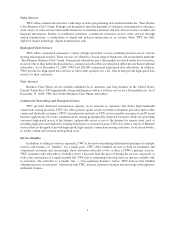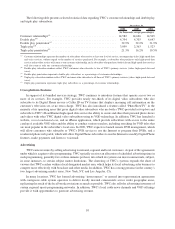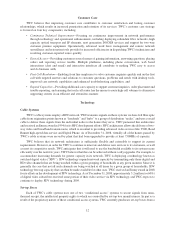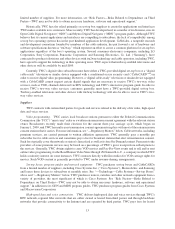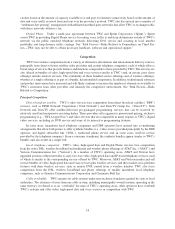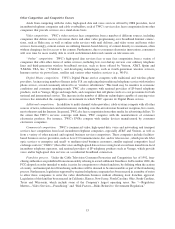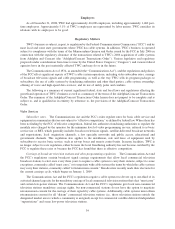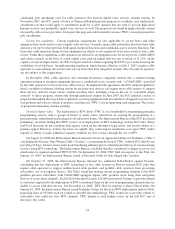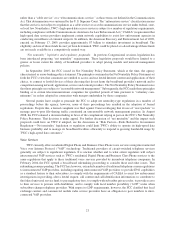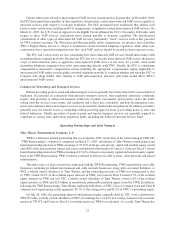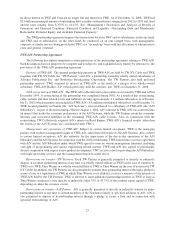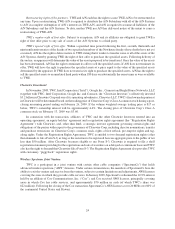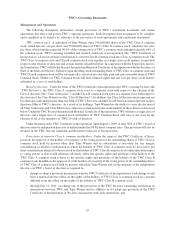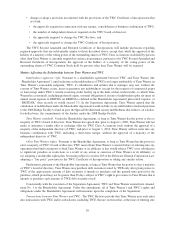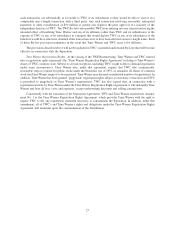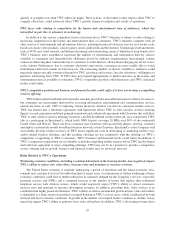Time Warner Cable 2008 Annual Report Download - page 29
Download and view the complete annual report
Please find page 29 of the 2008 Time Warner Cable annual report below. You can navigate through the pages in the report by either clicking on the pages listed below, or by using the keyword search tool below to find specific information within the annual report.Analog to digital migration. The migration of analog programming channels to digital tiers also allows TWC
to save bandwidth. On January 19, 2009, the FCC’s Enforcement Bureau issued two NALs concluding that TWC
moved channels in the Palcentia, California and San Diego systems from analog to digital tiers of service without
the required notice to customers, in violation of FCC rules. Each NAL proposes a fine of $7,500. These staff-level
decisions do not constitute final agency action, and TWC intends to seek further review by the full Commission.
Multiple dwelling units and inside wiring. In November 2007, the FCC adopted an order declaring null and
void all exclusive access arrangements between cable operators and multiple dwelling units and other centrally
managed real estate developments (“MDUs”). In connection with the order, the FCC also issued a Further Notice of
Proposed Rulemaking regarding whether to expand the ban on exclusivity to other types of multi-channel video
programming distributors (“MVPDs”) in addition to cable operators, including DBS providers, and whether to
expand the scope of the rules to prohibit exclusive marketing and bulk billing agreements. The order has been
appealed by the National Cable and Telecommunications Association (“NCTA”), the cable industry’s principal
trade organization. The FCC also has adopted rules facilitating competitors’ access to the cable wiring inside such
MDUs. This order, which also has been appealed by the NCTA, could have an adverse impact on TWC’s business
because it would allow competitors to use wiring inside MDUs that the cable industry has already deployed.
Copyright regulation. TWC’s cable systems provide subscribers with, among other things, local and distant
television broadcast stations. TWC generally does not obtain a license to use the copyrighted performances
contained in these stations’ programming directly from program owners. Instead, in exchange for filing reports with
the U.S. Copyright Office and contributing a percentage of revenue to a federal copyright royalty pool, cable
operators obtain rights to retransmit copyrighted material contained in broadcast signals pursuant to a compulsory
license. The elimination or substantial modification of this compulsory copyright license has been the subject of
ongoing legislative and administrative review, and, if eliminated or modified, could adversely affect TWC’s ability
to obtain suitable programming and could substantially increase TWC’s programming costs. Additionally, the
U.S. Copyright Office has released a ruling on issues relating to the calculation of compulsory license fees that
could increase the amount cable operators are required to pay into the copyright royalty pool. Further, the
U.S. Copyright Office has not yet made any determinations as to how the compulsory license will apply to digital
broadcast signals and services.
In addition, when TWC obtains programming from third parties, TWC generally obtains licenses that include
any necessary authorizations to transmit the music included in it. When TWC creates its own programming and
provides various other programming or related content, including local origination programming and advertising
that TWC inserts into cable-programming networks, TWC is required to obtain any necessary music performance
licenses directly from the rights holders. These rights are generally controlled by three music performance rights
organizations, each with rights to the music of various composers. TWC generally has obtained the necessary
licenses, either through negotiated licenses or through procedures established by consent decrees entered into by
some of the music performance rights organizations.
Program access and Adelphia/Comcast Transactions Order. In the Adelphia/Comcast Transactions Order,
the FCC imposed conditions on TWC, which will expire in July 2012, related to regional sports networks (“RSNs”),
as defined in the Adelphia/Comcast Transactions Order, and the resolution of disputes pursuant to the FCC’s leased
access regulations. In particular, the Adelphia/Comcast Transactions Order provides that (i) neither TWC nor its
affiliates may offer an affiliated RSN on an exclusive basis to any MVPD; (ii) TWC may not unduly or improperly
influence the decision of any affiliated RSN to sell programming to an unaffiliated MVPD or the prices, terms and
conditions of sale of programming by an affiliated RSN to an unaffiliated MVPD; (iii) if an MVPD and an affiliated
RSN cannot reach an agreement on the terms and conditions of carriage, the MVPD may elect commercial
arbitration to resolve the dispute; (iv) if an unaffiliated RSN is denied carriage by TWC, it may elect commercial
arbitration to resolve the dispute in accordance with the FCC’s program carriage rules; and (v) with respect to leased
access, if an unaffiliated programmer is unable to reach an agreement with TWC, that programmer may elect
commercial arbitration to resolve the dispute, with the arbitrator being required to resolve the dispute using the
FCC’s existing rate formula relating to pricing terms. The FCC has suspended this “baseball style” arbitration
procedure as it relates to TWC’s carriage of unaffiliated RSNs, although it allowed the arbitration of a claim brought
by the Mid-Atlantic Sports Network because the claim was brought prior to the suspension. In that case, in October
2008, the FCC’s Media Bureau upheld the arbitrator’s ruling in favor of the Mid-Atlantic Sports Network, and TWC
19


